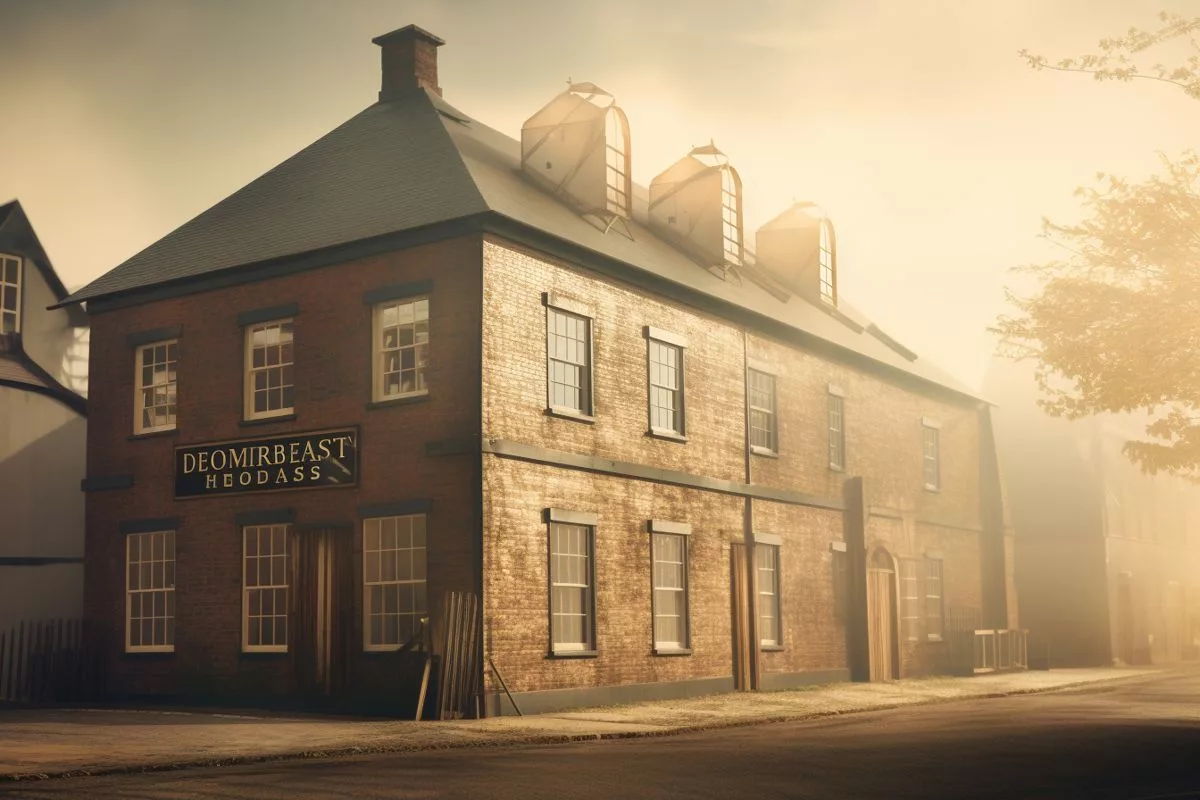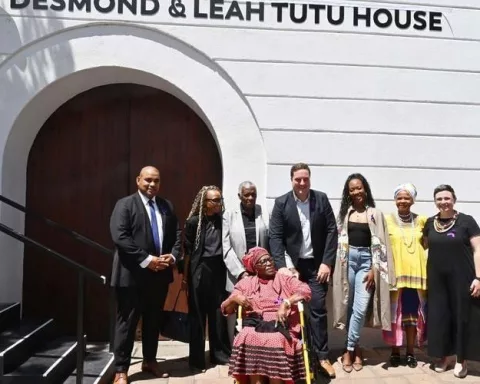The Old Granary building in Cape Town is getting a new name – the ‘Desmond and Leah Tutu House‘ – in honor of the late Archbishop Desmond Tutu and his wife, Leah Tutu. The building has played many roles over the past two centuries, from a bakery and granary to a female prison, a custom house, and public works offices. The Tutus’ foundation partially funded a renovation of the building in 2015, and the upcoming renaming ceremony is a validation of their lasting imprint on the city.
What is the Old Granary Building in Cape Town and why is it being renamed?
The Old Granary building in Cape Town has played many roles over the past two centuries, from a bakery and granary to a female prison, a custom house, and public works offices. The City Council recently decided to rename the building to the ‘Desmond and Leah Tutu House’ in honor of the late Archbishop Desmond Tutu and his wife, Leah Tutu, who have profoundly influenced South Africa’s political and socio-cultural landscape. The Tutus’ foundation partially funded a renovation of the building in 2015, and the upcoming renaming ceremony is a validation of their lasting imprint on the city.
Laden with the diverse narrative of South Africa’s past, the Old Granary building at 11 Buitenkant Street in Zonnebloem, stands as a living record of Cape Town’s progression. Erected between 1808 and 1813, this venerable edifice has played countless roles in two centuries, from a bakery and a granary to a female prison, a custom house, a court and police office, and Public Works offices. In accordance with a recent resolution by the City Council, this esteemed building is poised to embrace a fresh persona.
Process and Decision of Renaming
The renaming procedure for the Old Granary building was set in motion by the City’s Economic Growth Directorate, the division in charge of the building’s management. In September, a public participation initiative welcomed locals and other interested parties to voice their opinions on the proposed name change. The result of the public’s input was submitted to the Council on 7th December 2023, culminating in the decision to rebrand the Old Granary as the ‘Desmond and Leah Tutu House’.
The adopted name is a tribute to the life’s work of the late Archbishop Desmond Tutu and his wife, Leah Tutu. Both individuals have profoundly influenced not only Cape Town and South Africa but the world at large. Their contributions have significantly shaped South Africa’s political and socio-cultural landscape. They are recognized worldwide as icons of resilience, moral strength, and unwavering integrity. The renaming serves to perpetuate their legacy.
Support and Commendation for the Decision
Alderman Eddie Andrews, the City’s Deputy Mayor and Chairperson of the City’s Naming Committee, expressed his satisfaction at the Council’s decision. He extended gratitude to everyone who contributed to the renaming process. This included those who mooted the name change, the public participation unit that oversaw the commentary process, Mayor Geordin Hill-Lewis for his backing, and the Council for ratifying the decision.
The Tutus’ Connection with the Old Granary Building
The Old Granary building shares more than a historical link with the Tutus. In 2015, the Desmond and Leah Tutu Legacy Foundation partially funded a renovation of the building, enabling the foundation to utilize the space as a peace center, an archive center, a museum, and a City of Cape Town office.
This connection between the Tutu’s legacy and the Old Granary’s history further underlines the building’s new identity. As stated by Alderman James Vos, the City’s Mayoral Committee Member for Economic Growth, the renaming is more than just a label alteration. Instead, it signifies the continuation of Desmond and Leah Tutu’s legacy. Their dedication to uprightness and integrity, the influence they wielded, and the precedent they set are all encapsulated in the building’s new name, ensuring their impact remains woven into Cape Town’s socio-cultural tapestry.
The Upcoming Official Renaming Ceremony
The forthcoming official renaming ceremony scheduled for the new year is expected to be a memorable event, a befitting tribute to two extraordinary individuals. However, it’s not just about the ceremony. The rechristening of the Old Granary building to the ‘Desmond and Leah Tutu House’ signifies a validation of the principles championed by the Tutus. It bears witness to their lasting imprint on the city and serves as a reminder for future generations of their indelible contributions.
The renaming, therefore, is not just a memorial act. It is a pledge to carry forward the legacy of Desmond and Leah Tutu—a legacy of resilience, moral strength, and unbeatable integrity. As the Desmond and Leah Tutu House, the building will continue to be a significant landmark in Cape Town. It serves as a beacon that recollects the past, engages with the present, and inspires towards a future that upholds the virtues of these two extraordinary individuals.
1. What is the Old Granary Building in Cape Town and why is it being renamed?
The Old Granary building in Cape Town has played many roles over the past two centuries, from a bakery and granary to a female prison, a custom house, and public works offices. The City Council recently decided to rename the building to the ‘Desmond and Leah Tutu House’ in honor of the late Archbishop Desmond Tutu and his wife, Leah Tutu, who have profoundly influenced South Africa’s political and socio-cultural landscape.
2. What was the process and decision for the renaming?
The renaming procedure for the Old Granary building was set in motion by the City’s Economic Growth Directorate, the division in charge of the building’s management. In September, a public participation initiative welcomed locals and other interested parties to voice their opinions on the proposed name change. The result of the public’s input was submitted to the Council on 7th December 2023, culminating in the decision to rebrand the Old Granary as the ‘Desmond and Leah Tutu House’.
3. Who supported and commended the decision?
Alderman Eddie Andrews, the City’s Deputy Mayor and Chairperson of the City’s Naming Committee, expressed his satisfaction at the Council’s decision. He extended gratitude to everyone who contributed to the renaming process. This included those who mooted the name change, the public participation unit that oversaw the commentary process, Mayor Geordin Hill-Lewis for his backing, and the Council for ratifying the decision.
4. What is the Tutus’ connection with the Old Granary Building?
The Old Granary building shares more than a historical link with the Tutus. In 2015, the Desmond and Leah Tutu Legacy Foundation partially funded a renovation of the building, enabling the foundation to utilize the space as a peace center, an archive center, a museum, and a City of Cape Town office.
5. What is the upcoming official renaming ceremony?
The forthcoming official renaming ceremony scheduled for the new year is expected to be a memorable event, a befitting tribute to two extraordinary individuals. The rechristening of the Old Granary building to the ‘Desmond and Leah Tutu House’ signifies a validation of the principles championed by the Tutus and serves as a reminder for future generations of their indelible contributions.
6. What does the renaming signify for Cape Town’s socio-cultural tapestry?
The renaming of the Old Granary building to the Desmond and Leah Tutu House signifies the continuation of Desmond and Leah Tutu’s legacy. Their dedication to uprightness and integrity, the influence they wielded, and the precedent they set are all encapsulated in the building’s new name, ensuring their impact remains woven into Cape Town’s socio-cultural tapestry.









